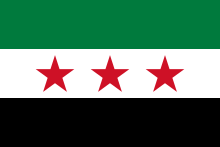
Back القوات المسلحة السورية Arabic Forces Armades Sirianes Catalan Streitkräfte Syriens German Fuerzas Armadas de Siria Spanish Forces armées syriennes French Forças Armadas da Síria Portuguese
This article has multiple issues. Please help improve it or discuss these issues on the talk page. (Learn how and when to remove these messages)
|
| Syrian Armed Forces | |
|---|---|
| القوات المسلحة السورية | |
 | |
| Founded | 1943 |
| Current form | December 2024 |
| Service branches | Syrian Army Syrian Air Force Syrian Navy |
| Headquarters | Hay'at al-Arkan, Umayyad Square, Damascus |
| Leadership | |
| Commander-in-Chief | Ahmed al-Sharaa (de facto) |
| Minister of Defence | Murhaf Abu Qasra |
| Chief of the General Staff | Ali Noureddine Al-Naasan |
| Personnel | |
| Military age | 18 |
| Industry | |
| Domestic suppliers | Syrian Scientific Studies and Research Center (CERS)[1][2] Établissement Industriel de la Défense (EID)[3][4] Syrian Defense Laboratories (SDL)[5] |
| Foreign suppliers | |
| Related articles | |
| History | Military history of Syria |
| Ranks | Military ranks of Syria |
The Syrian Armed Forces (Arabic: القوات المسلحة السورية, romanized: al-Quwwāt al-Musallaḥah as-Sūrīyah) are the military forces of Syria.
Up until the fall of Bashar al-Assad's Baath Party regime in December 2024, the Syrian Arab Armed Forces were the state armed forces. They consisted of the Syrian Arab Army, Syrian Arab Air Force, Syrian Arab Navy, Syrian Arab Air Defence Force, and paramilitary forces, such as the National Defence Forces. According to the 2012 Constitution of Ba'athist Syria, the President of Syria was the Commander-in-Chief of the Armed Forces.[8] The Minister of Defense held the position of Deputy Commander-in-Chief of the Army and Armed Forces.[9]
After 1943, the Syrian Army played a major role in Syria's governance, mounting six military coups: two in 1949, including the March 1949 Syrian coup d'état and the August 1949 coup by Colonel Sami al-Hinnawi, and one each in 1951, 1954, 1963, 1966, and 1970. It fought four wars with Israel (1948, the Six-Day War in 1967, the Yom Kippur War of 1973, and 1982 Lebanon War) and one with Jordan ("Black September" in Jordan, 1970). The Air Force and Navy acted more as adjuncts to the army than independent actors, apart from the Air Force/ADF's reaction to the Israeli Operation Mole Cricket 19 ahead of the 1982 Lebanon War. Syrian fighters and air defence systems took very heavy losses. An armoured division was also deployed to Saudi Arabia in 1990–91 during the Gulf War, but saw little action. From 1976 to 2005 the Army was the major pillar of the Syrian occupation of Lebanon. Internally, it played a major part in suppressing the 1979–82 Islamist uprising in Syria, and from 2011 to 2024 was heavily engaged in fighting the Syrian Civil War, the most violent and prolonged war the Syrian Army had taken part in since its establishment in the 1940s.
The military used conscription. Males served in the military from age 18, but they were exempted from service if they did not have a brother who can take care of their parents. Females were exempt from conscription. [10][11]
The Syrian Arab Armed Forces collapsed in 2024 with the fall of the Assad regime and flight of Bashar al-Assad.[12] The new de-facto rulers of Syria, Hay'at Tahrir al-Sham, are making preparations to drastically reorganise Syria's military forces and ambitions.[13]
On 21 December 2024 it was reported that Murhaf Abu Qasra had been appointed the new defence minister for the interim government,[14] while Ali Noureddine Al-Naasan serves as Chief of the General Staff.
- ^ Eden Kaduri, Yehoshua Kalisky, Tal Avraham (6 September 2023). "Rebuilding the Syrian Military: The Threat to Israel". INSS Tel Aviv University. Retrieved 25 November 2023.
{{cite web}}: CS1 maint: multiple names: authors list (link) - ^ Gertz, Bill (23 July 1996). "CIA Suspects Chinese Firm of Syria Missile Aid". The Washington Times.[dead link]
- ^ "IDENTIFYING MATERIEL MANUFACTURED IN THE DEMOCRATIC PEOPLE'S REPUBLIC OF KOREA (DPRK)". Conflict Armament Research. Retrieved 10 April 2024.
- ^ "Exploring Iran's Role in Syrian Defence Industry and its Geopolitical Ramifications". Special Eurasia. 8 August 2023. Retrieved 10 May 2024.
- ^ A Syrian-produced North Korean Type 68 rifle on sale in Yemen. We can notice the Syrian Defense Laboratories logo stamped on it, which we have seen in the past across Syria. (h/t @FighterXwar_ar).
- ^ a b c d e "Trade Registers". Archived from the original on 29 December 2017. Retrieved 26 May 2019.
- ^ "War Gains: Bulgarian Arms Add Fuel to Middle East Conflicts". 21 December 2015.
- ^ "Syrian Arab Republic: Constitution, 2012". refworld. 26 February 2021. Archived from the original on 5 March 2019.
- ^ "عنوان السيرة الذاتية للعماد علي عبد الله أيوب نائب رئيس مجلس الوزراء- وزير الدفاع" (in Arabic). pministry.gov.sy. Retrieved 23 January 2022.
- ^ Cite error: The named reference
Military Balance 2023was invoked but never defined (see the help page). - ^ "Syria Military Strength". www.globalfirepower.com. Archived from the original on 21 May 2020. Retrieved 21 May 2020.
- ^ Christou, William; McKernan, Bethan (8 December 2024). "Syrians celebrate fall of Bashar al-Assad after five decades of dynastic rule". The Guardian. ISSN 0261-3077. Retrieved 9 December 2024.
- ^ Straits Times 2024.
- ^ "Syria's new rulers appoint defense, foreign ministers". 21 December 2024.